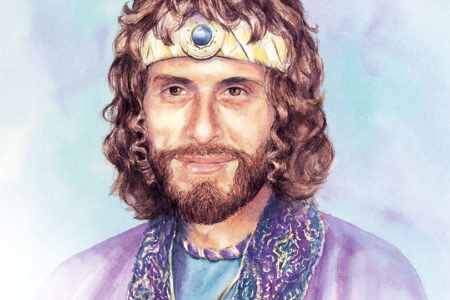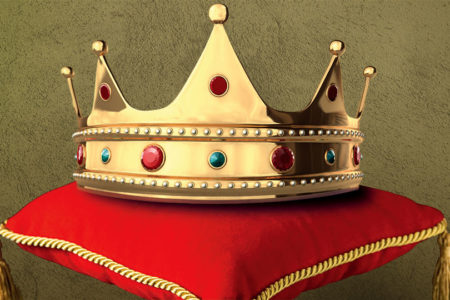Jehoshaphat’s Big Mistake
American radio talk-show host Don Imus, almost 90 Major League baseball players, and many others have something in common. Can you guess what it is? They believe good people can make bad decisions.
Don Imus believes it because he said it happened to him when he was forced to apologize in 2007 for his racial comments about the Rutgers University women’s basketball team. The baseball players believe it happened to them when the Mitchell Report named 89 of them for illegal use of steroids. In fact, many people caught in a bad spot are quick to say they are good people who merely made poor choices.
Judging by the preponderance of seminars, books, and DVDs available these days, the prevailing belief is that people can avoid bad choices. Employees can be taught to become people of integrity. Singles can be taught how to choose the right mates. There is even help for consumers who want to learn how to choose healthful foods.
The assumption is always that people are good but need help to make good choices. Scripture makes no such assumption. God’s Word is far more objective and a great deal less flattering to mankind. Most people make bad decisions because they reject true wisdom, which comes from God (Ps. 111:10; Eccl. 2:26; Jas. 1:5).
Unfortunately, that problem can plague believers and unbelievers alike, as it plagued Jehoshaphat, one of Judah’s godly kings.
When ancient Israel was divided in two, the northern kingdom (Israel) had bad kings only. The Bible says of each one that he “did evil in the sight of the Lᴏʀᴅ.” In the southern kingdom (Judah), 12 of its 20 rulers did the same. Yet eight kings “did what was right in the sight of the Lᴏʀᴅ.” And Jehoshaphat was one of them.
Jehoshaphat ruled for 25 years, from 873 to 848 B.C. Yet, though he loved the Lord, he stands today as an example of someone who failed to lean on godly wisdom and consequently made several dreadful decisions that cost him and his kingdom dearly.
An Unholy Alliance
Jehoshaphat was a powerful, prosperous king (2 Chr. 17:10–13). Mindful of the fact that Judah was bordered by Moab, Ammon, and Israel—all hostile—he knew he needed a strong and well-positioned military. So Jehoshaphat fortified his borders and increased his troops (vv. 12, 14–19). His actions did not go unnoticed because “the fear of the Lᴏʀᴅ fell on all the kingdoms of the lands that were around Judah” (v. 10).
A strong military was only part of the equation. Wanting no part of Israel’s spiritual corruption, Jehoshaphat tried to lead Judah to worship the Lord. In his third year of rule, he sent priests throughout the cities to teach his people the Law (vv. 7–9).
He also “set judges in the land throughout all the fortified cities of Judah, city by city” (19:5). He gathered the people to pray and seek the Lord, acknowledging Him as the God of heaven, the powerful one who rules all nations (20:6). As he prayed, “all Judah, with their little ones, their wives, and their children, stood before the Lᴏʀᴅ” (v. 13).
In addition, he appointed singers who led in songs of praise, lifting up the Lord’s name. Jehoshaphat was truly a minority among the kings of Israel and Judah because he did what was right in God’s sight.
Yet despite this zeal, Jehoshaphat played the fool by trying to travel two roads at the same time. On the one hand, he loved the Lord. But on the other hand, he formed a bond with ungodly Israel by forging a military alliance with Ahab, one of the northern kingdom’s most wicked kings, and letting his son marry Ahab’s daughter.
Jehoshaphat seemed to want an insurance policy in case the Lord failed him. While marriage alliances were a common way to forge peace between countries at odds with each other, this pact was an unholy union. Ahab and Jezebel were evil. They practiced abject paganism, flooded the land with Baal worship, and almost obliterated the worship of Jehovah from Israel.
The late C. I. Scofield astutely noted, “The marriage of Jehoshaphat’s son, Jehoram, to Ahab’s daughter, Athaliah, was a great mistake. The union was supposed to foster peace and cooperation between the two kingdoms, but it only degraded Judah.”1
Jehoshaphat should have known better. He made the monumental error of relying on the world’s wisdom instead of God’s. Years later, Athaliah usurped the throne of Judah and murdered all the heirs to the throne but one, almost annihilating the messianic line, before being killed herself.
The Ramoth Gilead Fiasco
In another monumental error, Jehoshaphat agreed to join Ahab in battle against Ramoth Gilead. Jehoshaphat told Ahab, “I am as you are, my people as your people, my horses as your horses” (1 Ki. 22:4). When he sought counsel as to how the battle would go, Ahab produced 400 “prophets,” all of whom probably served Baal and all of whom promised victory (v. 6).
Recognizing these men did not serve the living God, Jehoshaphat asked, “Is there not still a prophet of the Lᴏʀᴅ [ʏʜᴡʜ] here, that we may inquire of Him?” (v. 7). Ahab grudgingly mentioned Micaiah, adding, “but I hate him, because he does not prophesy good concerning me, but evil” (v. 8). Micaiah prophesied that Ahab would be killed.
Yet Jehoshaphat went into battle anyway and barely escaped with his life. Ahab, as Micaiah had prophesied, was killed. (2 Chr. 18:28–34).
Later God sent a prophet to Jehoshaphat to scold him: “Should you help the wicked and love those who hate the LORD? Therefore the wrath of the Lᴏʀᴅ is upon you” (19:2). God generously provides His wisdom when we ask for it (Jas. 1:5). But He does not force us to accept it.
Unfortunately, even after all that happened to him, Jehoshaphat still did not “get it.” He joined with Ahab’s son Ahaziah, king of Israel, to build trade ships to go to Tarshish. Those ships never made it, for we are told, “‘The Lᴏʀᴅ has destroyed your works.’ Then the ships were wrecked” (2 Chr. 20:37).
When unbelievers refuse God’s wisdom, we justify it by saying, “Well, they don’t know the Lord. What do you expect?” But when believers reject God’s wisdom, they needlessly play the fool and often end up mired in terrible circumstances.
Don Imus was fired from his job. The baseball players named in the Mitchell Report were disciplined. And Jehoshaphat’s bad choices brought great trouble to Judah. His son, King Jehoram, was an evil king who ruled like his father-in-law, Ahab, because he had Ahab’s daughter as a wife (21:6).
True wisdom comes only from God. Jehoshaphat’s life is a warning to everyone who loves the Lord. Do what is right with a loyal heart, and always heed His Word “because the foolishness of God is wiser than men” (1 Cor. 1:25). “How much better to get wisdom than gold! And to get understanding is to be chosen rather than silver” (Prov. 16:16).
ENDNOTE
- C. I. Scofield, ed., The New Scofield Study Bible (New York: Oxford University Press, 1967), 434 n. 1.








Thank you for an enlightening lesson!
Is the church of 2022 forming unholy alliances? I think so–the election was stolen, right?
Great lesson indeed. I have learnt a lot. Bless you.
Thank you brother,
its a great lesson to learn
Want to know more about God and encouraging words from the Holy Bible.
Evangelist, Godwin, Living testimony
Great lesson
Thank you for your thoughts on the mistakes Jehoshaphat made, was he as a king chasing money, when he went into partnership to build ships for Tharshish
Thank you for the insight history of King Jehoshaphat.
Same as David and Solomon,
Starts on the Right footing,
End up leaning not on God’s wisdom. Forgetting God’s wisdom and keep their choices of their soul. A devastating misery.
Thank you for explaining these biblcal events with such clarity. So enlightening.